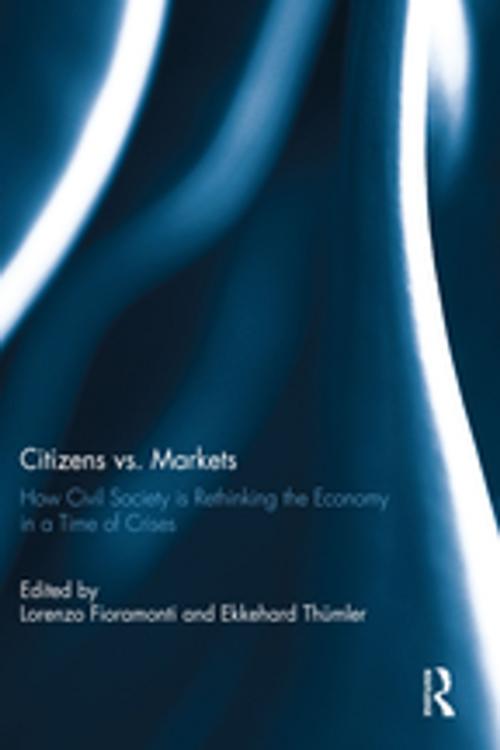Citizens vs. Markets
How Civil Society is Rethinking the Economy in a Time of Crises
Nonfiction, Social & Cultural Studies, Political Science| Author: | ISBN: | 9781351571777 | |
| Publisher: | Taylor and Francis | Publication: | July 5, 2017 |
| Imprint: | Routledge | Language: | English |
| Author: | |
| ISBN: | 9781351571777 |
| Publisher: | Taylor and Francis |
| Publication: | July 5, 2017 |
| Imprint: | Routledge |
| Language: | English |
After an apparent temporary relief, the financial crisis is back full steam. Thedouble dip has turned into a full-blown meltdown of financial markets, public budgets and, by and large, democratic accountability. This global crisis is a fundamental wake-up call: a signal that our conventional political economy and, perhaps, the very foundations of our societies need a serious rethink. Currently, the spotlight is on the role of political elites and economic agents (especially the investors included in the vague notion ofmarkets ) and their strategies to stabilize or destabilize countries, from North America to the Eurozone. Regrettably, the actual and potential role of civil society is hardly mentioned in public debate. Yet, it is exactly within civil society that important responses to the crisis may emerge. It is within civil society that an alternative paradigm and a fundamental rethinking of conventional wisdom may be fostered. Citizens vs. Markets is the first book to unpack the transformative role of civil society in a sector in which it has traditionally been less proactive, in order to reflect on possible forms of social transformation that are not merely remedial but also constructive in nature. This is the most important struggle of our times.This book was published as a special issue of the Journal of Civil Society.
After an apparent temporary relief, the financial crisis is back full steam. Thedouble dip has turned into a full-blown meltdown of financial markets, public budgets and, by and large, democratic accountability. This global crisis is a fundamental wake-up call: a signal that our conventional political economy and, perhaps, the very foundations of our societies need a serious rethink. Currently, the spotlight is on the role of political elites and economic agents (especially the investors included in the vague notion ofmarkets ) and their strategies to stabilize or destabilize countries, from North America to the Eurozone. Regrettably, the actual and potential role of civil society is hardly mentioned in public debate. Yet, it is exactly within civil society that important responses to the crisis may emerge. It is within civil society that an alternative paradigm and a fundamental rethinking of conventional wisdom may be fostered. Citizens vs. Markets is the first book to unpack the transformative role of civil society in a sector in which it has traditionally been less proactive, in order to reflect on possible forms of social transformation that are not merely remedial but also constructive in nature. This is the most important struggle of our times.This book was published as a special issue of the Journal of Civil Society.















